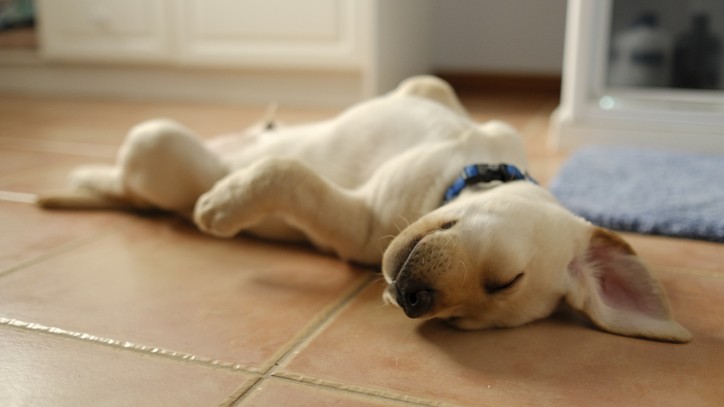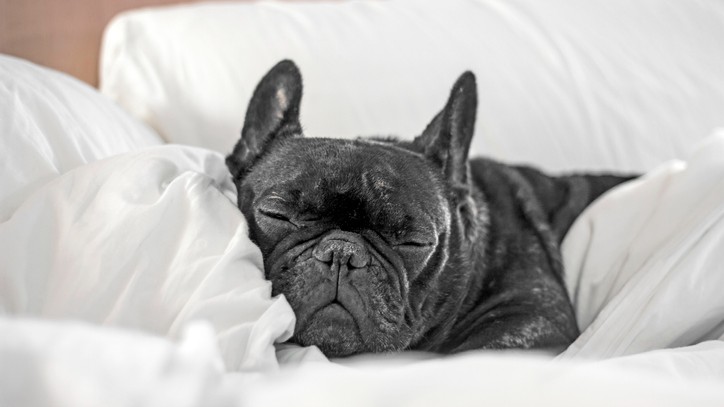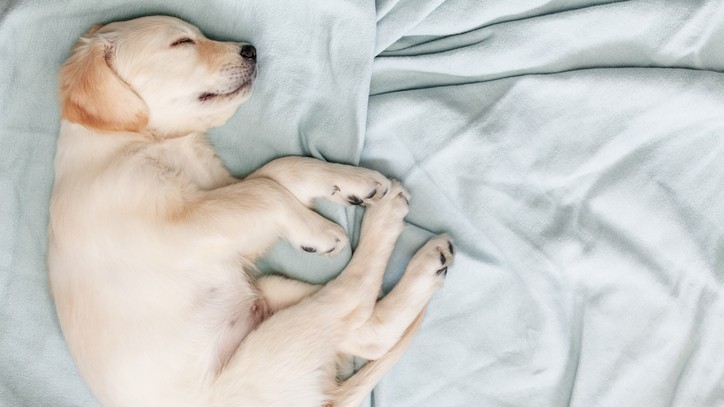How much sleep does a puppy need?
Are you wondering, how much sleep does a puppy need? Don’t worry – it’s perfectly normal for them to snooze for ages

Get the best advice, tips and top tech for your beloved Pets
You are now subscribed
Your newsletter sign-up was successful
Have you ever asked, how much sleep does a puppy need? It’s always an exciting time to welcome a lively, new puppy into the family. But if you’ve noticed that your lovable pup spends most of the day sleeping rather than awake, this is not unusual.
In fact, it’s perfectly normal for healthy puppies to sleep up to 20 hours a day (yes, you heard right!) for healthy development. Once your pup gets a little older, they may be interested in fun activities, so it may be worthwhile to check out how to play with a puppy to keep them engaged and entertained.
In addition, if you need more advice about caring for your pup, you can read our useful guide on new puppy advice to help settle your pooch into their new home. In the meantime, read on to answer your question of how much sleep does a puppy need, and find out some other helpful tips.
Why do puppies need so much sleep?
Just like babies, puppies need a lot of sleep for their physical and mental development and well-being. And since puppies develop rapidly, a lot of their energy is used up on growing, eating and playtime activities.
This can be exhausting for a pup and can take its toll on their young bodies and curious minds – not forgetting that they are constantly learning new things about the world around them. As a result, regular naps are vital to recharge their little bodies and reserve energy.

How many hours of sleep does a puppy need?
Depending on their age, your new puppy will most likely need around 18-20 hours of sleep each day. A healthy 12-week old puppy would need an average of 15 hours a day, a 16-week old puppy would average around 11 hours a day, and by the time they reach one year, they should settle into a sleep routine of a typical dog.
While this may seem like a lot of snoozing, if your bouncing pup doesn’t get enough rest, they can become over-tired and cause behavioral issues. Similar to a young child, they will begin to zoom frantically around the home because they are restless or over-excitable.
Get the best advice, tips and top tech for your beloved Pets
Where can my puppy sleep?
Similar to young children, puppies are unable to hold their bladder at night (until they are toilet trained), so it’s advisable not to let them sleep in your bed. A crate is recommended in the early stages, with some soft bedding to keep them warm and cozy.
You can have their crate in your bedroom in the first stages, before moving them to another room. Once you’ve decided where your puppy will be sleeping, always stick to it. Then they’ll know that will be their own designated bed space (and not in your bed!).
How do you establish a sleep routine at night?
First, create a cozy ‘bedtime’ space that is warm and welcoming. If it’s a crate or one of the best dog beds, line the bottom with a couple of soft, felted blankets, or perhaps throw in a favorite toy. You can also add a piece of clothing with your scent so that your pup feels close to you at bedtime.
Next up, always take your puppy for a toilet break before bedtime to prevent any messy accidents during night. Then, dim the lights or put on some relaxing music to calm your weary pup to help with sleeping. Try to make the environment as calm as possible so your pup will learn that it’s ‘bedtime’.

As well as keeping our growing pups fit and healthy, this is also a good way to tire them out before bedtime. Since they are engaged and occupied during the day, they will need to recharge their batteries, and should happily retreat to their cozy bed at night.
How long can it take before they sleep at night?
Bear in mind that you need to be consistent with your sleep schedule. Training can be a long process, and you need to stick to the schedule until your pup gets used to bedtimes. Some pups can easily sleep for 6-8 hours at night, while others can take up to six months! Every pup is different, but with patience and a lot of love and affection, your pup will soon be used to their night time slumber. If you don’t think your furry friend is sleeping enough, this is how to tire out a puppy.
You might also want to learn how to stop your puppy crying at night and why shouldn't you sleep with your dog.
Cynthia Lawrence is freelance lifestyle journalist. Starting off her career in national magazines, she moved to digital and e-commerce publications. When she's not reviewing exciting products, she is obsessed with home interiors and her neighbour's cat!

